By: debbie lynn elias
When it comes to Matteo Garrone’s REALITY, I don’t know which is more striking – Alexandre Desplat’s lilting, haunting and sweeping score that is a pure delight, Marco Onorato’s sumptuous vivid cinematography, Matteo Garrone’s deliciously macabre script and virtuoso direction, or Aniello Areno’s performance as Luciano, the fishmonger with big dreams. Quite honestly, this would be my pick as Best Foreign Language Film Oscar Nominee. It succeeds on every level. Delicious, dark comedy juxtapositioned against rich, vibrant, bright sumptuous visuals creating a stunning metaphoric tone from which you can’t turn away. REALITY succeeds on every level.
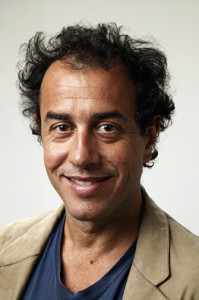
Rooted in reality, actually based on the true story of writer/director Matteo Garrone’s brother-in-law, this is the story of Luciano. A simple fishmonger in Naples, Luciano has always been rather outgoing, performance happy, loves being the center of attention. And he LOVES the tv show Big Brother. With a degree of sincerity in their accolades, and a lot of humor, Lucianofs friends and family urge him to be on the show. He has charisma! He has talent! He makes people laugh! Hefs a perfect contestant. And so, Luciano persuades his brother-in-law, who knows people associated with the show, to let him audition. So confident after the audition that he will make the cut, Luciano descends into the madness of his own adoration and belief that without Big Brother, he will cease to exist. It is the tragicomic events that unfold that bring REALITY, and its metaphoric messages, to life.
I had a chance to sit down with writer/director Matteo Garrone in this exclusive 1:1 interview and talk about life, love, family and casting an actor who is serving life in prison in the jails of Italy for killing three fellow “gangsters” in Naples. (Now if thatfs not a story for another movie, I don’t know what is!) Passionate, focused and charming, and with little need for his Italian interpreter, Matteo spoke candidly with me about REALITY, in more ways than one.
I have to congratulate you. I am in love with this film. It is so stunning both in its message, its content, and visually with your use of color, your camera angles. You grabbed me right off the bat with the opening scene.
Oh, thank you. The opening scene is really interesting. I like it very much. Just the opening and the ending I like very much. [laughing]
Very key about the opening is that because so much of your film is old world set against new world, with the opening, you have your old world family values which transforms into Luciano’s descent into his Big Brother obsession and a ” pretend” family situation. I love the way you‘ve created this dichotomy within the film. And the opening wedding scene sets up the family situation so beautifully. It’s wonderful. Where did this story come from?
Yes. The beginning. The dreams. The fairytale. From a true story. It happened to the brother of my wife. [Laughing] No, it’s fine. He revived the [fish market] shop and so he’s fine. He sells fish in Naples. If you go there, you have to buy the fish through Luciano, the fish shop in Naples. You can talk with him!
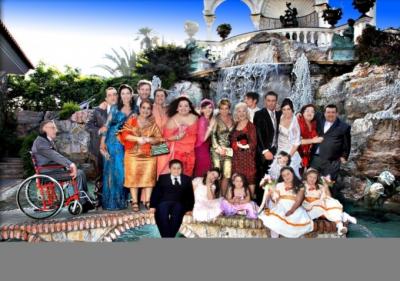
With this story in the family already, did you have any problem with him agreeing to let you tell this story?
Of course I asked him after all the nightmare and tragedy. I spoke to him. He was fine. He went to a doctor. So he wanted to, when I talked with him, he wanted to work on this project. So we decided to start to talk, to make a treatment. He came on the set. He talked a lot with Aniello [Arena], the actor. Then, he took the money and re-opened the shop.
He didn’t get any money for Big Brother but he got it from you!
[laughing] He’s the only one who really gets money from this movie! In the real story, I was Anzo.In the real story, I recommended him to the casting of Big Brother. He knew from my wife that my studio was in the same building with the Big Brother people. So he asked my wife if I knew the “author” and if I could help him. So, I said, “Okay. No problem. I know them. I see [them] everyday at lunch. No problem. I can ask them.” So, I did. He arrived in Rome. He came to the studio, he came to say hello to me and then he went to audition. It seems that the audition went so well and the fact that I made the recommendation and the audition went so well, so when he went back to Naples, everybody was waiting for the new star. I didnft know the change, how he was changed. And now the story became a tragedy. I didn’t know because I live in Rome with my wife. I heard about this story a long time after, 7 or 8 months after, and then I was really surprised. But, I didn’t start to work immediately. I was still working on other projects. Then I met him in the summer, he came to the seaside where I was, and we start to talk. He was fine and then I start to think about this story. It could be interesting and also a metaphor of something much more universal. Big Brother is not important in this story. Big Brother is the MacGuffin in Hitchcock.
It’s important to [know] the film is people that want to escape from their everyday life. They hope to win the ticket of the lottery. But they don‘t need it. That is the sad thing.
They’ve won the lottery to begin with.
It’s like if you’re never satisfied with what you are. It’s something that I can understand because it’s part of the society where we live. It’s something that is very close to many people that I know and also to me, always desire something else or maybe lose yourself or wish something more.
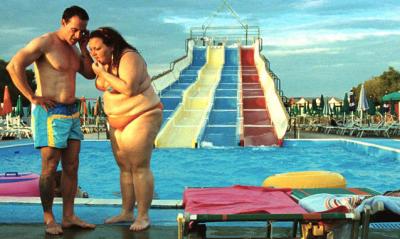
That’s what‘s so important and so wonderful about how you have the foundation of this film being the family. We can see that he has all the riches in the world with the love of his family and his friends.
Yes. And the family has a double meaning. Because the family at the beginning push him so [they’re] an accomplice of what happened. The family pushed him because he was really fun. Every party in the house, he was fun. But everyone said, “You are much better than all the actors or characters on television.” So, he starts to think about it and they push him. And then when he starts to lose himself, his mind, they start to complain. But they never realize that they were an accomplice of this. It’s like a Greek chorus but very important in this story. It’s not a story just about a man that wants to become famous. It‘s the story of a man that starts [to be] pushed by others, the family, and it starts like a joke, a game. And then things change and become much more serious and became existential. To be there it means that he exists. That he can prove to everybody that he succeeded, that he exists, is something that became much more complex than being rich and famous, as it seems at the beginning.
As I was watching, it felt that to him he could not exist, he would not be here, unless he did this, unless he got on Big Brother; his whole existence was dependent on getting on the show. Without it, he would evaporate into nothing.
Exactly.
It’s so beautiful the way you get us to that point. You pace it beautifully. You don’t hurry it up, you don‘t slow it down. It goes at a wonderful pace, like life. There are points in the film you surprise us, just like life. Things that turns and itfs beautiful to watch this unfold.
Thank you.
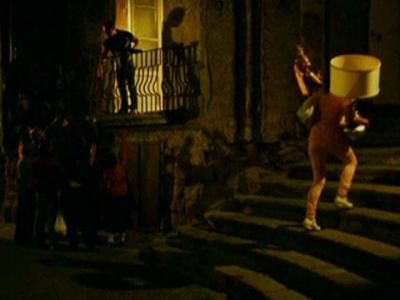
Where is the square, the location, that you shot in, found in Naples? It‘s so charming.
It’s a square that we rebuilt. The art director [production designer], Paolo Bonfini, rebuilt the square. It was an abandoned square. It was a park for cars. We recreated a square. Very warm. With Christ. It was very important that the fish market could be a stage. It’s like if Luciano’s acting in theater when he sells fish.
The religious aspects of having statues of Christ and crucifixes is very important to the Italian culture, but it also sets up another part of the film. The church is there, religion is there, the love of his family, the love of God, but he wants Big Brother and tv. You have these wonderful elements that all come together.
The television and the religion and the church are two powers, really strong.
And Luciano got pulled to the wrong side!
[laughing] Yes. He did.
Your cinematography is stunning. How did you and Marco Onorato go about developing your lighting, your color palettes as, quite honestly, your use of light and color is breathtaking.
Thank you. With Marco we always work together since the very beginning of my career. I remember my first movie I’ve done when I was 26. The crew, there were 3 of us. Me, Marco and the sound man. We’ve made a long journey together. In this movie, we wanted to tell a story that could be believable but at the same time a fairy tale, surreal. So, we used color – very bright. I used to say that for me it was a Pixar movie. The character must be very expressive and of course, also the photography has to be very colorful and bright, but at the same time also realistic with dark parts. We are always very instinctive on our decisions in choosing the movement of the camera or when to use a dolly or when to use hand-held camera. Unfortunately, Marco passed away in May [2012]. He was my second father. He stayed with my mother for 40 years. He was the father of my brother. He came to Cannes and saw the movie in Cannes and passed away after a week.
This is a lovely legacy to Marco. A truly lovely part of REALITY is Alexandre Desplat‘s score. Lilting, haunting, dramatic and delightful. How did you and he work and decide on the kind of music you wanted.
Alexandre immediately when he saw the movie started to think about earlier movies of Fellini. He said that his favorite composer ever was Nino Rota, the composer of all of Fellini’s movies. We started from that, from Nino Rota. He started to work on the music, trying to keep the lessons of Nino Rota but finding his personal way. He started to propose to me some melody. We talked about in a very pleasant way...the music is sort of a voice over to the story. It accompanies the film and the character during this journey. It’s really been a great experience for me. It was my first movie with Alexandre and was a great experience. Human and artistic.
The score is so beautiful. It‘s like an accompaniment to your characters. It‘s not behind, it‘s not in front, it‘s going right alongside the journey with them.
It’s never invasive. He did a great job.

One of the big things with this film is the fact that your lead actor, Aniello Areno, was in prison. How do you navigate those waters when the man you want as your lead actor is in jail?
I think this is the first movie where a prisoner is the leading actor. [laughing] Let’s start from the [fact that] the man that is in jail is an actor. He started to be an actor while in jail. He started to be the leading actor of this company.
Jail teaches good things!
In jail you can find good actors. That’s true! And [Aniello] discovered his talents thanks to this great director, Armando Punzo. And his life changed. I decided to cast [Aniello Areno] when I saw him in theater. I knew he was perfect for this role. And he was an actor. So we asked the judge for permission and we were assured there was no problem because he already had permission to go out with the theater company to act. But one week before we started shooting, the judge said, “No.” We were astonished. Why can he go out to act in theater but he canft act in cinema? Why? Because theater is less visible in the media. The director of the theater went to the director of prisoners and said, “Why? He can act with me but not in cinema. Why? Cinema is more important.” So, I had luck because I met six months before in a dinner with a judge connected to the crime system, I had met during the period of making Gomorrah, a guy that was the director of all the prisons. He was very important. He wrote a book about terrorism in Italy in the 1980’s. I had the number of this guy so I called him to ask what was going on. I was really upset, not just because for me it was very important to have Aniello in the movie, but because I was thinking about him in prison and how sadistic it is. You teach to a man a work. It was over 13 years that he learned to act. And when I arrive, the moment a director chooses him for the leading actor of a movie, they say “No.” I think it‘s very hypocritical. It’s better to say, “Okay. If you make a mistake in the past, you will never have a chance to go back into society.” I think it would be much more honest. So, this man said, “Okay, let me see why the judge said no. If there are good reasons, I can’t do anything. But if the reasons are not important and just the problem of ’coming back’ from the media, I will do something.” And he went to check and the reasons were completely nonsense. The judge said “no” because “[W]e don’t where we can find him during the shooting.” We gave the [shooting schedule] to the police. They can find him at every moment. Three days before we start shooting, he changed from negative and became positive. I remember [Aniello] said that in jail someone said to him, “You have some saint in paradise.”
Did you have to have police on set watching Aniello?
Sometimes they came. I remember the first time they came it was very fun. They were looking for the prisoner, Aniello Areno, and he arrived dressed like a drag queen because we were shooting the wedding scene. So the police were very disgusted as seeing ’the lifer’ like this. In drag. [laughing] But, we never had a problem. We were very precise and respected the rules and the program.
It was worth every bit of effort to get Aniello in this film because he‘s wonderful.
I think his performance is really amazing. It’s also important because he brings something of his past in this character. Not his past connection to the crimes, but his past connection to the fact that he stayed for 20 years in a prison so during the journey of Luciano, he really discovers something [for himself]. You can see it in the eyes. There was a light. Something thatfs surprising. Every moment, something new.
He also embraces and brings this wonderful enthusiasm like a little kid at recess. It’s lovely watching that. You don’t often see that free-spirit.
Yes. I remember at Cannes the movie was received in a controversial way. Some were expecting something closer to Gomorrah, but most of the critics were all agreed and said that the work of Aniello was amazing.
You‘ve been making films for quite a while. You‘re quite good at it. So, now as you sit back and have a few films under your belt that are well received, respected and loved, what do you think is the greatest gift that filmmaking gives to you? You give us a beautiful gift with your films, but what does filmmaking give to you?
Thank you. Oh! Many, many gifts. With my work I can meet lots of people. I can discover a lot of places. I can develop characters that are related with me so it’s a way to discover something, some part, some aspect, of me with the character. It‘s a way to use color. I was a painter so my approach is always very visual. I have my group of friends. I believe a lot in the group because to make cinema is a collaborative art. I believe in the group. I like the idea of going back to make cinema with my friends.
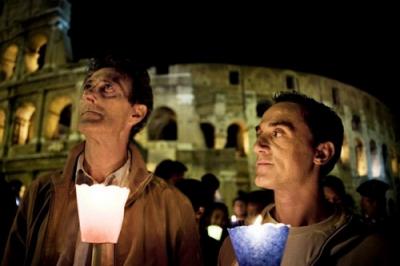
Are you working on anything new right now?
No, but I will soon. I will go back to Rome. This is my last trip for REALITY and then I will go back to Rome and start to write.
You need to get home and work on another film because I love your films. I loved Gomorrah but REALITY just touches my heart. It paints its own picture.
I will be thinking of you while I write!
#












